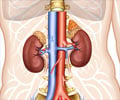A new study reveals that childhood cancer survivors tended to be hospitalized more often and for long durations compared to others due to blood disorders and other problems.

"Regular cancer-focused health care is important for identifying health problems for survivors throughout their lives," Kirchhoff added. "Patients and families who have experienced childhood cancer should obtain a cancer treatment summary and recommendations for follow-up care from their oncologist, and coordinate their follow-up care with their oncology and primary care doctors to ensure their health care needs are being managed."
In this study, survivors were 52 percent more likely to be hospitalized, and their number of admissions was 67 percent higher, compared with age and sex-matched individuals who did not have cancer. Survivors were also 35 percent more likely to have stayed longer every time they were hospitalized, compared with controls.
"The Affordable Care Act has several provisions that will improve insurance for cancer survivors, including expanding coverage to dependents up to age 26, prohibiting insurance denials based on health status, and eliminating lifetime limits on coverage," noted Kirchhoff. "Better insurance coverage should hopefully help survivors identify and manage health problems at earlier, less costly stages."
Kirchhoff and colleagues identified 1,499 childhood cancer survivors treated between 1975 and 2005 who were at least five years past their original cancer diagnosis from the Utah Population Database (UPDB) and the Utah Cancer Registry. They collected information including demographics, type of cancer, and type of treatment. Data on subsequent hospitalizations were obtained from the Utah Department of Health hospital discharge records. Using UPDB, they also identified 7,713 subjects who did not have cancer, who served as age and sex-matched controls in this study.
About 50 percent of the survivors included in this study were female, and 98 percent were non-Hispanic white. The researchers found that both female survivors and male survivors were more likely to have been hospitalized than their respective controls. Female survivors also had a longer average length of hospital stay than female controls.
Advertisement
Common reasons for hospitalizations for survivors compared with the controls included conditions like blood disorders (such as anemia) and cancer, although it is unclear if this was for their original cancer diagnosis or new cancers. Infections, nervous system problems, and respiratory problems were other leading reasons for hospitalization.
Advertisement
Source-Eurekalert















